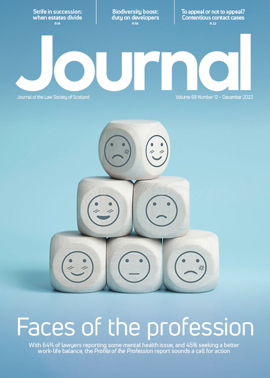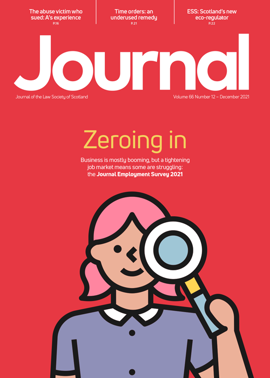Post-pandemic practice positives

The majority of private practice firms in Scotland appear to have overcome the negative economic impact of the COVID-19 pandemic, a new survey by the Law Society of Scotland has found.
The Society’s third survey into the financial impact of coronavirus on Scottish private practice legal firms shows that staffing levels and workloads have largely returned to pre-pandemic levels for most firms and, in some instances, increased.
Undertaken in September 2021, 11 months on from the second survey, telephone interviews were conducted with cashroom managers at a representative sample of 136 firms in private practice (a different sample from the firms previously surveyed). Key findings include:
- Most of the small minority of firms who still had solicitors or support staff on furlough indicated their intention to have all staff return to work once the furlough scheme ended on 30 September. Only one firm was considering staff redundancy. A few were planning flexible part time working.
- The pandemic has not significantly impacted firms’ recruitment plans: 59% of respondents said they intended to keep solicitor staff numbers at their existing levels over the next 12 months, while 24% plan to increase these. No firms said they would decrease solicitor staff. (The balance were defer, freeze, or don’t know.) For support staff, the figures were 65% and 20% respectively.
- On trainee recruitment, almost two-thirds of firms surveyed do not plan to change their trainee numbers in the next 12 months (a majority of these firms do not normally recruit trainees). However, almost one in five plan to increase their trainee recruitment next year.
- Almost half of firms (49%) reported that their workload has increased or significantly increased compared to pre-pandemic levels. While 27% of firms reported a reduced or much reduced workload, in the previous survey half of all firms reported a reduction.
- Looking ahead, 46% expect workloads to remain the same in the coming year, and 44% predict an increase in work. Just 10% of firms predict their workloads will fall. Similar positive responses were given regarding anticipated turnover in the next 12 months (in October 2020 44% of firms predicted a fall in the coming year).
- New ways of working have embedded themselves: two thirds of firms say they will implement or continue with hybrid working arrangements, and one fifth that they will have some staff working exclusively from home. Only one firm indicated that hybrid working had not worked well, but almost a quarter were likely to discontinue (exclusive?) homeworking.
- On staff wellbeing, almost two thirds of all firms indicated they would have regular conversations with staff to help with any issues that may have arisen due to the pandemic; almost one fifth say they have a formal wellbeing strategy in place. (Of the remaining one third, some were sole practitioners.)
Ken Dalling, President of the Law Society of Scotland, commented: “While it is encouraging to hear that many firms have seen work levels increase and that they are positive about the future, we fully understand that this is not the situation that all firms are in. We will continue to do all we can to support the whole of the profession as we navigate our way out of the pandemic.”
Read the report
Read the survey report, which contains further data on anticipated changes (or not) in client expectations, demands and satisfaction.
Trainee numbers make up lost ground
Trainee numbers showed a sharp recovery in the 2020-21 practice year, when the number of traineeships begun totalled 744, significantly up on the 434 started in 2019-20, the Society has reported.
The full annual statistical report is awaited, but the Society says the increase indicates that parts of the profession are recovering from the impact of the COVID-19 pandemic, with increased activity in some practice areas. Trainee figures have also been bolstered by the number of traineeships deferred from 2020 to 2021 due to the pandemic, and by the Scottish Government’s fund to support 40 legal aid traineeships, which launched in June.
The average across the last two practice years is 588 trainees a year, comparable to pre-pandemic levels.
Liz Campbell, the Society’s executive director of Education, Training & Qualifications, said: “We must remain cautious about the future and what traineeship recruitment will look like, given the ongoing impact of the pandemic on the profession and wider economy.
“We know that a high number of Diploma graduates are in the traineeship market and securing a traineeship will continue to be competitive. As ever, we would urge all final year LLB students to consider the current environment when deciding their next steps, whether that is to do the Diploma or an alternative career.”
Regulars
Perspectives
Features
Briefings
- Criminal court: OLRS – life means life
- Corporate: Will a deal impact on national security?
- Intellectual property: IP and AI – the latest
- Agriculture: Securing successor crofting tenant status
- Succession: Back of an envelope – testamentary intent?
- Scottish Solicitors' Discipline Tribunal
- Data protection: Google off the hook
- Property: Beautifully presented tedium
- In-house: Lawyers in uniform
In practice
- Your Law Society of Scotland Council members
- Legal services regulation reform – have your say
- The Word of Gold: Whither goest thou?
- Coaching: help in a fast changing world
- The earlier the better
- Family mediation accreditation: a view from the panel
- The Eternal Optimist: Just to say thanks…
- Appreciation: Albert Vincent Sheehan
- Ask Ash: A broken work circle






